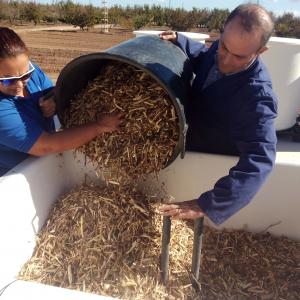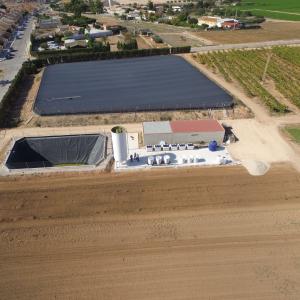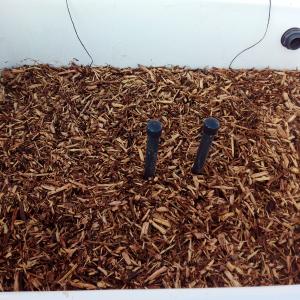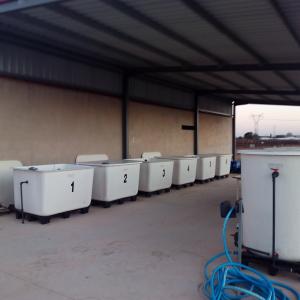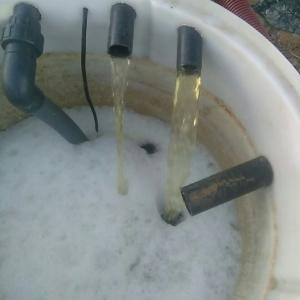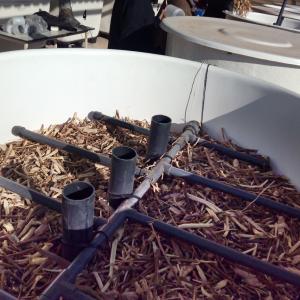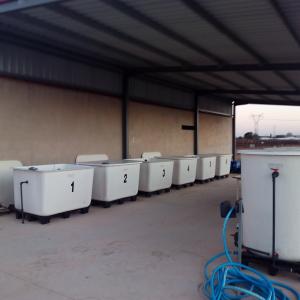
Cátedra de Agricultura Sostenible para el Campo de Cartagena UPCT-Fecoam-Coag
http://www.catedraagriculturasostenible.es/organigrama/
09/2017 – 12/2021
UPCT, INSAL-ECOGEST
A bioreactor consists in a trench in the ground packed with carbonaceous material such as wood chips that allow colonization of soil bacteria that convert nitrate of the water to nitrogen gas (denitrification). These bioreactors have been successfully employed to reduce nitrogen loads from the crop irrigation water in USA, from Upper Mississippi River Basin to the Northern Gulf of Mexico.
The project aims to apply bioreactors for brine denitrification (and eventually brine depuration) in the real scenario of an agricultural catchment located in a semiarid Mediterranean area (Campo de Cartagena, SE Spain). In a first phase combinations of different hydraulic retention times (HRT) and organic substrates (e.g. woodchip of different sizes and from different species), will be assayed during 12 months in experimental bioreactors (containers) of different sizes and capacity. The results will allow to select optimum HRT and substrate under variability of seasonal temperature and to evaluate bioreactors as sinks or sources of other pollutants (including potentially toxic compounds). In a second phase bioreactors at real scale will be constructed (soil trenches) based on the results of the first phase. In both phases, physico-chemical parameters influencing denitrification process such as pH, redox potential, temperature, will be regularly monitored into the bioreactors. Samples will be collected and analysed for a set of chemical and biological parameters (e.g. EC, nitrate, nitrite, ammonium, phosphate, etc.) in order to assess the effectiveness of the bioreactors in water depuration.
PhD Thesis:
Título: Denitrification of saline agricultural effluents (brine from groundwater desalination plants and agricultural leachates) in woodchip bioreactors in the SE of Spain. Doctorando: Carolina Díaz García. Directores: Juan José Martínez Sánchez y José Álvarez Rogel Universidad Politécnica de Cartagena. Facultad / Escuela: ETSIA. Fecha: febrero 2021
Artículos
Díaz-García, C., Martínez-Sánchez, J.J., Maxwell B.M., Franco, J.A., Álvarez-Rogel, J.2021. Woodchip bioreactors provide sustained denitrification of brine from groundwater desalination plants. Journal of Environmental Management 289 (2021) 112521. https://doi.org/10.1016/j.jenvman.2021.112521.
Maxwell, B., Díaz-García, C., Martínez-Sánchez, J.J., Birgand, F., Álvarez-Rogel, J. (2020). Temperature sensitivity of nitrate removal in woodchip bioreactors increases with woodchip age and following drying-rewetting cycles. Environmental Science: Water Research & Technology. https://doi.org/10.1039/D0EW00507J.
Maxwell, B., Díaz-García, C., Martínez-Sánchez, J.J., Álvarez-Rogel, J. 2020. Increased brine strength increases nitrate reduction rates in batch woodchip bioreactors treating brine from desalination. Desalination 495, 114629. https://doi.org/10.1016/j.desal.2020.114629.
Congresess
Carolina Díaz-García, Juan T. García, M Carmen Tercero, José Alvarez-Rogel and Juan J. Martínez-Sánchez. 2018. Denitrification of brine from primary reverse osmosis in woodchip bioreactors: experimental set up and first data in a medium-scale experiment in SE Spain. Oral presentation: International Water Association Regional Conference on Water Reuse and Salinity Management (IWARESA).
Carolina Díaz-García, Juan Tomás García Bermejo, Ibrahin Tunc, José Alvarez-Rogel y Juan José Martínez-Sánchez. 2018. USO DE BIORREACTORES CON MADERA PARA DESNITRIFICACIÓN DE SALMUERAS EN EL CAMPO DE CARTAGENA. XII Congreso Internacional de Aedyr –Toledo.

